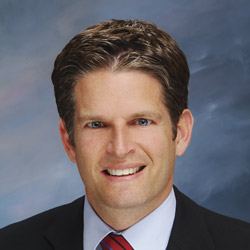
Dr. Jeffrey Klopfenstein serves as assistant professor of neurosurgery at the University of Illinois College of Medicine at Peoria (UICOMP) and chief of the cerebrovascular section at the Illinois Neurological Institute (INI). He is responsible for the surgical care of patients with diseases and conditions that affect the blood vessels of the brain and spinal cord, as well as those with complex tumors that affect the base of the skull. This involves operative and ICU care of a complex subset of patients who are frequently quite ill. As assistant professor at UICOMP, Klopfenstein instructs neurosurgery residents and medical students on the management of cerebrovascular and general neurosurgical patients.
Just one year into his employment at INI, Dr. Klopfenstein was asked to be the chief of the cerebrovascular and brain tumor sections—an appointment usually offered to a neurosurgeon who has been on the job for three or four years.
Dr. Klopfenstein has received many awards and honors, including the National Institutes of Health Summer Research Fellowship at the University of Arizona College of Medicine, where he also served on the curriculum committee. He is extensively published and has given numerous presentations on various topics relating to neurosurgery. Klopfenstein is active in various professional associations, including the American Association of Neurological Surgeons, the American Medical Association and the Congress of Neurological Surgeons.
Despite his heavy workload, Klopfenstein is able to spend quality time with his wife and six children. He attends soccer games, school plays and other programs in which his children are involved, and dedicates much of his spare time to volunteering in the community and at his church. He takes mission trips to help the poor in Mexico and helps needy families in the local Peoria community.
Coming from a family of modest means, Klopfenstein, the oldest of five supported himself throughout his higher education. His dream of becoming a doctor began when he was a high school freshman, and despite the challenges of paying for college and medical school himself, Klopfenstein kept his goal in front of him every step of the way.
Taking out no student loans, Jeffrey Klopfenstein paid for his education by working more than 30 hours a week on top of a full-time student workload. This hard work paid off when he graduated first in his class from the University of Arizona College of Medicine and was accepted into one of the finest residency programs in the country at Barrow Neurological Institute. The challenges Jeffrey Klopfenstein has overcome inspire his students as they face similar issues in their own lives. iBi

